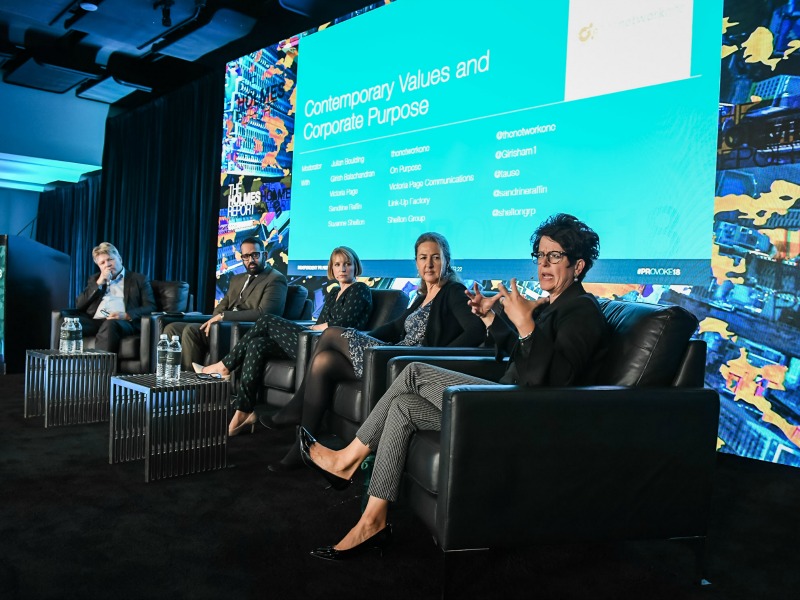Diana Marszalek 22 Oct 2018 // 9:06PM GMT

WASHINGTON — PR firms can play a pivotal role in helping companies identify and communicate larger purpose, but those efforts will be for naught if the people in the C-suite aren’t committed to those ideas, according to industry leaders.
“Purpose really does have to be embraced at the most senior level. They have to believe in it hell or high water,” said Suzanne Shelton, whose communications agency, Shelton Group, focuses on energy and the environment. “It can’t be just a marketing campaign.”
Shelton’s comments were part of a panel discussion on the topic of corporate values and purpose that kicked off the Independent PR Firm Forum at the Holmes Report’s PRovoke18 Global PR Summit Monday afternoon in Washington. The discussion explored the range of issues related to the topic — defining corporate purpose, why and how companies are embracing the idea and what marketing professionals can do to help them in embracing and communicating purpose among them.
Panelists, all of whom work in purpose-driven marketing, said brands that rally around purpose are in prime position to foster change and promote their values, if, in fact, they do so in a way that is authentic, transparent and in line with what the company actually is and does.
“There is an opportunity for brands to take a higher ground and offer individuals to be part of something bigger,” said Girish Balachandran, whose New Delhi firm On Purpose Comms is focused on working with brands to drive social change in India.
Companies with purpose also have a greater chance of creating long-lasting relationships with consumers that share their values, speakers said. “It’s easy to get repeat purchases, but that doesn’t mean you have any loyalty,” said Victoria Page, whose eponymous agency specializes in purpose sustainability strategy and communications.
Panelists, however, said companies have to think long and hard before declaring and communicating a stated purpose, because if it’s not authentic — truly inherent to the company — there are risks.
“Purpose is what you stand for above all else — you’re willing to lose money over it and get into a fight over it; 86% of us want companies to stand for something beyond just making money,” Shelton said.
For Sandrine Raffin, president and founder of Link-Up Factory, that starts with the very nature of whatever it is companies are selling, and whether it benefits the range of stakeholders, from consumers to the environment. A soap company, for instance, that doesn’t research its ingredients, for instance, can’t have a credible purpose when, in reality, it could be hurting consumers, she said.
“Purpose starts really with the way you are producing your product .. and its impact on people upstream and downstream and on the planet,” she said.
And having purpose and values also is something companies across-the-board need to take seriously, as consumers of all kinds are increasingly calling for corporate responsibility and accountability.
“We’re in the middle of a social shift, and it’s not just being driven by millennials,” Shelton said, adding that consumers are starting to feel increasingly culpable for some of the world’s greater problems and want companies to do the same.
“If you see video of plastics in the ocean or plastics inside birds, you are culpable,” she said. “It’s become impossible for many of us to say, ‘That’s not my problem.’”


































.jpg)








.tmb-135x100.jpg)









